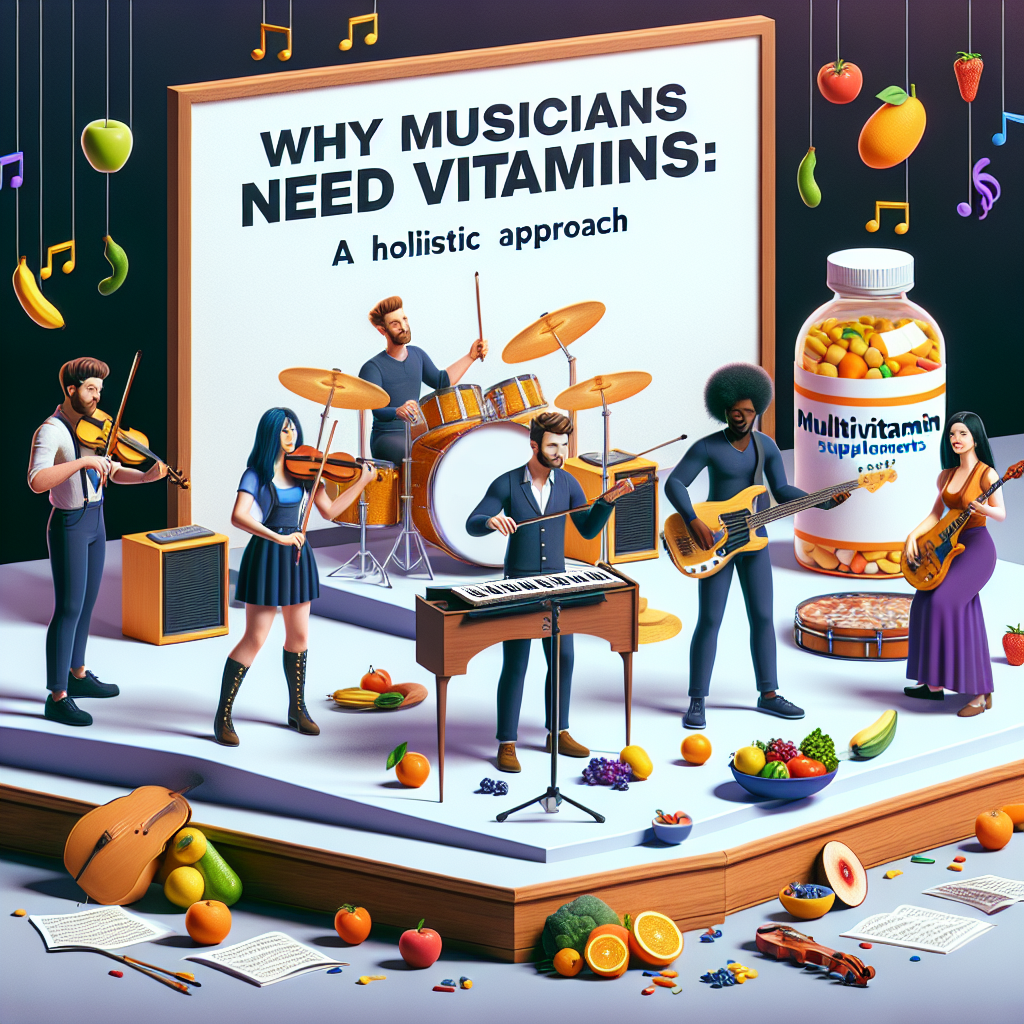Why Musicians Need Vitamins: A Holistic Approach

Discover why vitamins are essential for musicians and how a holistic approach can enhance your performance. Learn more about the importance of nutrition in music and start your journey towards a healthier lifestyle today. Click here to find out more.
The Essential Role of Vitamins in Enhancing Musicians’ Performance: A Holistic Perspective
Musicians, like athletes, require a certain level of physical and mental stamina to perform at their best. The demands of long rehearsals, late-night performances, and the stress of creativity can take a toll on their health. This is where a holistic approach to health, particularly the intake of essential vitamins, can play a pivotal role in enhancing a musician’s performance.
Vitamins are organic compounds that our bodies need in small quantities for normal growth and metabolism. They are essential for the proper functioning of our bodies and the maintenance of our physical and mental health. For musicians, these nutrients can provide the necessary energy and stamina required for their demanding schedules.
Vitamin B complex, for instance, is known for its role in energy production. It helps convert food into fuel, allowing the body to stay energized throughout the day. This is particularly beneficial for musicians who often have long and irregular working hours. A deficiency in B vitamins can lead to fatigue, weakness, and even depression, all of which can significantly affect a musician’s performance.
Similarly, Vitamin C is another essential nutrient that musicians should not overlook. It is a powerful antioxidant that helps protect the body against the harmful effects of free radicals, which are produced during high-stress situations like performances. Moreover, Vitamin C is crucial for the production of collagen, a protein that helps maintain the health of the skin, blood vessels, and vocal cords. For singers and wind instrument players, maintaining vocal cord health is of utmost importance.
Vitamin D, often referred to as the “sunshine vitamin,” is also crucial for musicians. It plays a significant role in mood regulation and bone health. Musicians, especially those who tour frequently, often experience changes in mood due to irregular sleep patterns and constant travel. Regular intake of Vitamin D can help regulate mood swings and prevent the onset of depression. Additionally, for musicians who play instruments, strong bones are essential to withstand the physical demands of their craft.
Lastly, the importance of Vitamin E cannot be overstated. It is a potent antioxidant that helps protect body tissue from damage and enhances the immune system. A strong immune system is vital for musicians who are often exposed to different environments and irregular sleep patterns, making them susceptible to illnesses.
However, it’s important to note that while vitamins are essential, they are not a substitute for a balanced diet, regular exercise, and adequate rest. Musicians should strive for a holistic approach to health, incorporating a balanced diet rich in vitamins, regular physical activity, and sufficient rest into their daily routines. This will not only enhance their performance but also improve their overall well-being.
In conclusion, vitamins play an essential role in enhancing a musician’s performance. They provide the necessary energy, protect against damage from stress, maintain the health of vital organs like the vocal cords, regulate mood, and boost the immune system. By adopting a holistic approach to health, musicians can ensure they are at their best, both physically and mentally, ready to face the demands of their craft.
Why Musicians Should Prioritize Vitamin Intake: A Comprehensive Guide

Musicians, like athletes, require a unique set of physical and mental attributes to perform at their best. They need to have excellent hand-eye coordination, a sharp memory, and the ability to concentrate for extended periods. However, the demands of a musician’s lifestyle can often lead to neglecting their health, particularly their nutritional needs. This is where vitamins come into play. Vitamins are essential nutrients that our bodies need in small amounts to function correctly. They play a crucial role in maintaining our overall health and wellbeing, and for musicians, they can significantly enhance their performance.
One of the primary reasons why musicians should prioritize vitamin intake is to boost their energy levels. The B-vitamins, for instance, are known for their role in converting food into energy. They help the body metabolize fats and proteins, which can provide musicians with the stamina they need during long rehearsals and performances. Moreover, B-vitamins are also essential for a healthy nervous system. They can help improve a musician’s coordination and reaction times, which are vital for playing an instrument or singing.
Another reason why vitamins are essential for musicians is their role in maintaining mental health. The life of a musician can be stressful, with irregular schedules, constant traveling, and the pressure to perform. This can lead to anxiety and depression if not managed properly. Vitamins like B6, B9, and B12 have been shown to help regulate mood and prevent mental health disorders. They can help musicians stay focused and calm under pressure, which can significantly improve their performance.
Vitamins also play a crucial role in maintaining a healthy immune system. Musicians often work in close quarters with others, making them susceptible to catching colds and other illnesses. Vitamin C is well-known for its immune-boosting properties. It can help protect musicians from getting sick, ensuring they can perform at their best. Additionally, Vitamin D, often obtained from sunlight, is essential for bone health. It can help prevent conditions like osteoporosis, which can affect a musician’s ability to play an instrument.
Lastly, vitamins are essential for maintaining good eye health. Musicians need to have excellent vision to read music and see their instruments clearly. Vitamins A, C, and E are known for their role in maintaining eye health. They can help protect the eyes from damage and maintain good vision, which is crucial for a musician’s performance.
In conclusion, vitamins play a crucial role in a musician’s health and performance. They can help boost energy levels, maintain mental health, strengthen the immune system, and preserve good eye health. However, it’s important to remember that vitamins should not replace a balanced diet but should be used as a supplement to a healthy lifestyle. Musicians should consult with a healthcare professional to determine the right vitamins and dosage for their specific needs. By taking a holistic approach to their health, musicians can ensure they are at their best, both on and off the stage.
The Impact of Vitamins on Musicians’ Health and Creativity: A Holistic Approach
Musicians, like any other professionals, require a balanced diet to maintain their health and enhance their creativity. However, the demanding nature of their work often leads to irregular eating habits, which can result in nutritional deficiencies. This is where vitamins come into play. They are essential nutrients that the body needs in small amounts to function properly. They play a crucial role in maintaining the health and well-being of musicians, thereby directly impacting their creativity and performance.
Vitamins are essential for various bodily functions, including energy production, immune function, and brain health. For musicians, these functions are particularly important. They need energy to perform, a strong immune system to prevent illnesses that could disrupt their schedules, and a healthy brain to create and perform music. Vitamins such as B-complex, C, and E are particularly beneficial in these areas.
The B-complex vitamins, which include thiamine (B1), riboflavin (B2), niacin (B3), pantothenic acid (B5), pyridoxine (B6), biotin (B7), folate (B9), and cobalamin (B12), play a crucial role in energy production. They help the body convert food into glucose, which is used for energy. This is particularly important for musicians who often have demanding schedules and need a constant supply of energy to perform at their best.
Vitamin C, on the other hand, is well-known for its immune-boosting properties. It helps the body produce white blood cells, which are essential for fighting off infections. This is particularly important for musicians who are often exposed to different environments and people, increasing their risk of catching infections. By boosting their immune system, vitamin C can help musicians stay healthy and maintain their performance schedules.
Vitamin E is a powerful antioxidant that protects the body’s cells from damage. It is particularly beneficial for brain health, as it protects the brain cells from oxidative stress, which can lead to cognitive decline. This is crucial for musicians, as their creativity and performance heavily rely on their cognitive abilities. By protecting their brain health, vitamin E can help musicians maintain their creativity and performance levels.
However, it’s important to note that while vitamins are essential for health and well-being, they are not a substitute for a balanced diet. Musicians, like everyone else, should aim to get most of their nutrients from food. This includes a variety of fruits, vegetables, whole grains, lean proteins, and healthy fats. Supplements can be used to fill in any nutritional gaps, but they should not be relied upon as the primary source of nutrients.
In conclusion, vitamins play a crucial role in maintaining the health and well-being of musicians, thereby directly impacting their creativity and performance. They provide the energy needed to perform, boost the immune system to prevent illnesses, and protect brain health to maintain creativity. However, they should be used as a supplement to a balanced diet, not as a substitute. By taking a holistic approach to their health, musicians can enhance their creativity and performance, and ultimately, their success in the music industry.